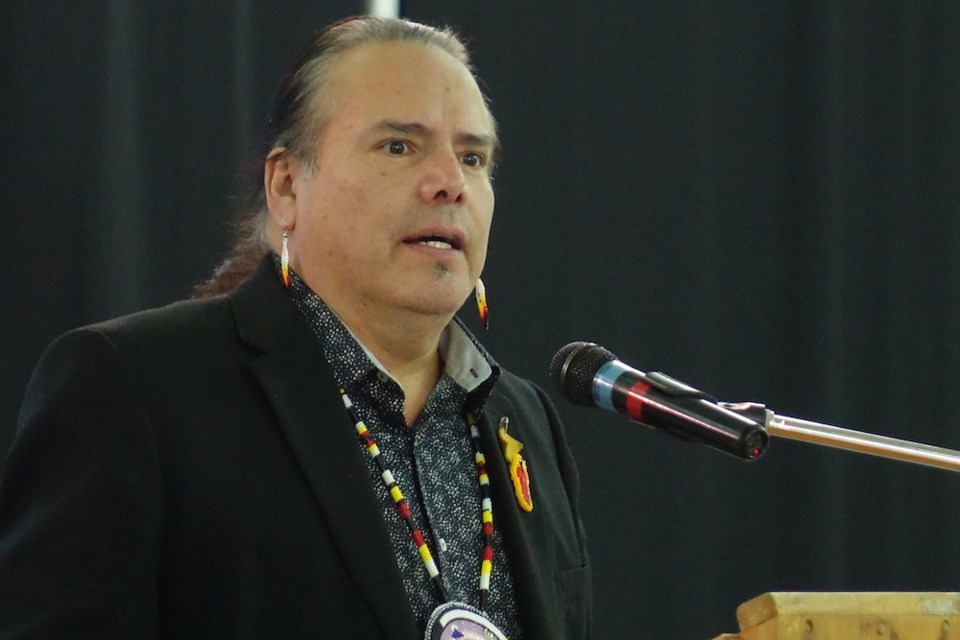Leaders of Manitoba Keewatinowi Okimakanak (MKO) met Jan. 7 to discuss how to mitigate the effects of the COVID-19 omicron variant in 26 Northern Manitoba First Nations.
The summit came as at least 10 northern First Nations have instituted travel restrictions or lockdowns in an attempt to stem the spread of the coronavirus and Manitoba’s number of new cases rockets higher than ever before, though public health officials concede that the officially confirmed cases probably only represent about 10 per cent of the actual number of infections.
“MKO leaders have a wide range of concerns related to the pandemic,” the organization’s Grand Chief Garrison Settee said in Jan. 7 news release. “As we have seen in earlier waves in Manitoba, the cases tend to rise in Northern Manitoba later than the south. Today, we discussed the need to be proactive and ensure measures are in place that will enable us to respond appropriately to the outbreaks that will occur as the omicron variant makes its way through the province.”
“Although we have not heard of any lab-confirmed cases of the omicron variant in our First Nations, we are assuming the variant is already in our communities. Our leaders are raising the alarm over the need to ensure planning is done now to ensure our communities have access to sufficient health care staff as well as essential service workers. MKO First Nations access health services both through on-reserve nursing stations as well as off-reserve health centres and hospitals. We expressed our concern to the province about the closures of hospitals that serve our communities along with a potential lack of access to timely medical services once COVID-19 cases begin rising in our communities.”
Jan. 7 also marked the one-year anniversary of the arrival of the first COVID-19 vaccines in Northern Manitoba First Nations.
“One year ago, we were filled with great hope as the first vaccines were administered in Pimicikamak Cree Nation and Norway House Cree Nation,” Settee said. “Thank you to the many health care heroes who have been involved in advocating for access and delivering the COVID-19 vaccines to First Nations citizens across Manitoba.”
“If you have not yet received a COVID-19 vaccine, I encourage you to do so. As well, limit your contacts, reduce non-essential travel, and get vaccinated. I’m thankful to have received my vaccines, including my booster shot, to help protect me from the COVID-19 virus.”
Although a majority of all eligible Manitobans and a majority of residents of northern First Nations have received at least one dose of COVID-19 vaccine, Settee says some aren’t able to get booster shots.
“The lack of health care staff is also impacting the ability of some MKO citizens to access their third COVID-19 vaccines. We know the COVID-19 boosters work and we are hopeful all MKO communities can have access to their third shots as soon as they become eligible. We are also encouraging all MKO citizens who have children ages five and over to consider first and second doses for your children. This will help provide some protection to children if they do contract the virus.”
Longstanding issues that can’t be solved overnight continue to affect Northern Manitoba First Nations and make the COVID-19 pandemic harder to deal with.
“There are many concerns we won’t be able to resolve during one meeting,” said Settee. “For example, a lack of housing and access to high-speed internet continues to be a pressing concern for our communities. Now is the time for us to conduct business via online meetings and for students of all ages to be accessing their lessons online. High-speed internet in all communities is an ongoing need. An increase in housing would also assist with the ability of people to properly isolate, and help prevent the spread of the virus, when diagnosed with COVID-19.”
First Nations are also taking note of the effects of pandemic measures on their citizens.
“I am concerned about the mental wellness of MKO citizens young and old as we continue to navigate this pandemic and live with lockdowns. Some community members have experienced hydro outages this week during extremely cold temperatures. It is difficult to help one another through these trying times when we are in lockdowns to prevent the spread of COVID-19. I urge all partners to consider mental wellness initiatives to support the well-being of MKO citizens.”
Settee said it is comforting to know that First Nations are now getting access to new therapies to treat those who contract COVID-19, even if there is still some red tape to sort out.
“We have some hope in knowing the monoclonal antibody treatment is now available and we are also pleased to learn that approval for new antivirals is expected soon,” said the grand chief. “Although the monoclonal antibody treatment is available, we understand our nursing stations must receive outside approval to administer this treatment. MKO encourages the province to consider removing this extra step.”



